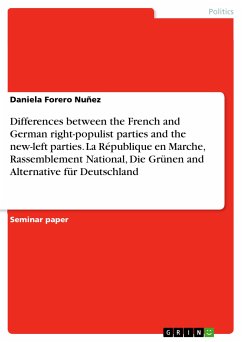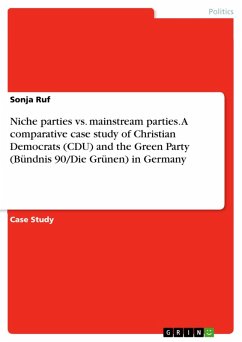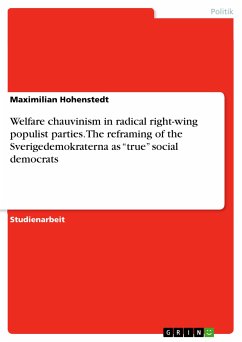Seminar paper from the year 2022 in the subject Politics - Other International Politics Topics, grade: 1,3, University of Frankfurt (Main) (Political Sciences with a Focus on Qualitative Empirical Social Research), course: Forschungspraktikum: Politische Ökonomie und die Struktur des sozialstaatlichen Konfliktes, language: English, abstract: This paper aims to analyze whether there are any significant national differences between the French and German right-populist parties Rassemblement National and the Alternative für Deutschland and the new-left parties La République en Marche and Bündnis 90/Die Grünen in their approving or disapproving positionings regarding immigration and multicultural identity, two of the most prominent cultural issues nowadays. The so-called social individualization shaped sociological discourse, especially in Germany, until the 1980s, challenging the previous conception of a rather static social structure, predetermined by class and status. Recently, in view of the increasing social inequalities in western societies, concepts like class and cleavage seem to reappear in the debate. The reincarnation of class in post-modern societies makes room for diametral opposite living environments and lifestyles hard to reconcile with each other. Moving to the political dimension, the concept of cleavage1 links individual political values and beliefs with macro-institutional aspects of political systems, enriching thus the debate on how political parties mobilize particular social groups. Given that this development concerns several western societies, a row of terms has emerged to illustrate this phenomenon in different national contexts. Western European political systems have responded to the increasing relevance of the cultural dimension and have reconfigured themselves, giving birth to and consolidating right-populist parties since the 2010s. Globalization has further accentuated this cultural conflict line, making room for fully antagonistic views on cultural issues, such as immigration. Hence, political parties have turned into agents of the political-cultural ressentiment resulting from globalization, or have moved towards more progressive political agendas, appealing to those generally profiting from a changing world.
Dieser Download kann aus rechtlichen Gründen nur mit Rechnungsadresse in A, B, BG, CY, CZ, D, DK, EW, E, FIN, F, GR, HR, H, IRL, I, LT, L, LR, M, NL, PL, P, R, S, SLO, SK ausgeliefert werden.









